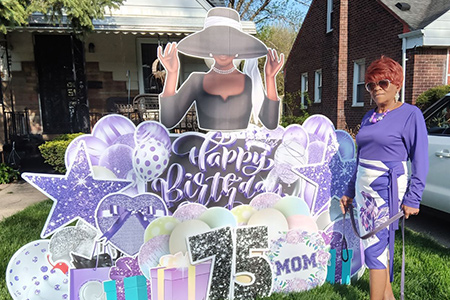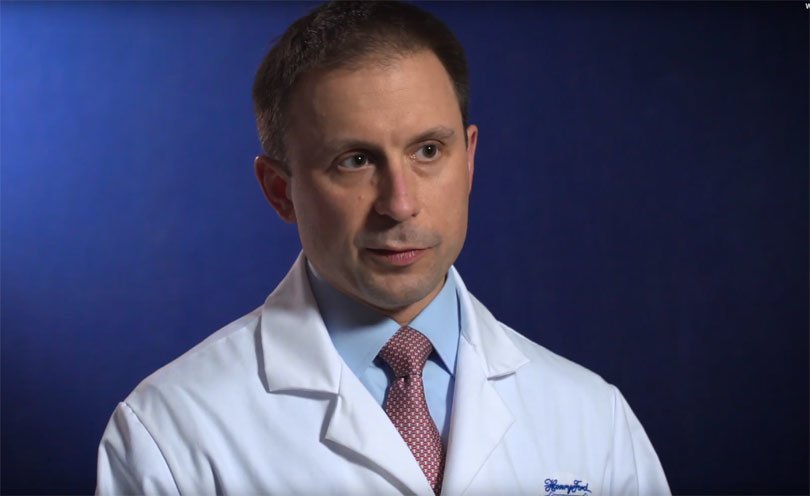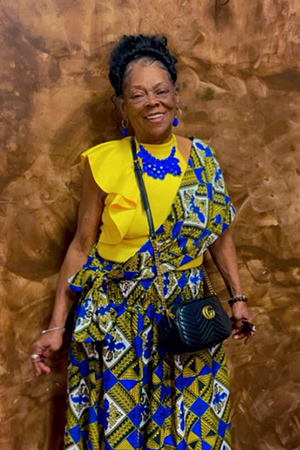Tumors compared
Thoracic surgeon Andrew Popoff, M.D. and members of the thoracic tumor board reviewed the images from her PET and CAT scans. Two additional spots on her lung were identified.
After a biopsy, molecular tests were done. Says Dr. Popoff, we compared the findings to the original tumor and concluded it was a new tumor, not metastatic disease. Mable’s situation was complicated because she had a lobectomy on her left lung in 2018. So doing a second lobectomy could be the functional equivalent of having a whole lung removed.
Individualized care plans
Tests of her lung and heart were done to determine if surgery was even a safe option.
“For this type of difficult case, only a subset of patients would be eligible for surgery. I think a lot of surgeons and oncologists would shy away from a situation like this and recommend radiotherapy, not surgery. However, we’re accustomed to seeing complex cases and creating individualized care plans. I think that’s an advantage of coming to a place like this,” says Dr. Popoff.
“I looked Dr. Popoff straight in the eye when he was talking so he knew how I felt. My doctors were very compassionate,” says Mable, a former smoker. “They were plain talking about what was going to happen and what they would do. I love that about them. I had to trust them.”
Action vs. worry
To cope with the news, Mable went home and knelt at her “bedside Baptist church.” She says, “I know how faith works. I took the problem to God and left it there. If you’re going to ask God for something, get out of the way. So, I didn’t worry.”
Instead, she prepared herself. “I did everything I was supposed to do to make this a success. I watched my glucose levels. I started juicing and making super green protein drinks with spinach. I told myself that if it’s white, don’t take a bite,” laughs Mable, a pasta lover.
Dr. Popoff performed robotic surgery and removed the second stage 1 cancer. Mable was discharged several days later, and she did not require chemotherapy or radiation afterward.
“This patient had a somewhat unusual situation, and overall, she did well,” says Dr. Popoff.
Receiving and giving support
One daughter, a nurse, stayed with Mable during the day. Her other daughter stayed at night, and granddaughter Arielle helped, too.
“All day long, I’m grateful for everything. If I get negative thoughts, I find something else to do. I have lots of friends, and I encourage them about their health,” says Mable who has lived in the same neighborhood for nearly five decades. Her husband of 53 years died of esophageal cancer, and her son died of prostate cancer.
“I love Henry Ford. I always tell people, ‘Honey, if I get sick, take me to Henry Ford. If you have to run any red lights, do it. I’ll pay the tickets...’”
“I love Henry Ford. I always tell people, ‘Honey, if I get sick, take me to Henry Ford. If you have to run any red lights, do it. I’ll pay the tickets,’” she laughs.
Mable’s third fight with cancer has changed her life. “I want to share more love and spend more time with people,” says Mable who was raised with 12 siblings. “If I see a need, I’m going to fill the void, so I don’t dwell on myself all the time.”
Mable advises other patients to stay focused on what you can do. Ask your doctors anything, and carefully listen to them. Whatever you believe in, believe it with all your heart. Most important, heal from the inside out and think about the joys and pleasures of life. For Mable, that will include fishing trips with her grandkids this summer and finally eating pasta again.
.svg?iar=0&hash=F6049510E33E4E6D8196C26CCC0A64A4)

/hfh-logo-main--white.svg?iar=0&hash=ED491CBFADFB7670FAE94559C98D7798)


